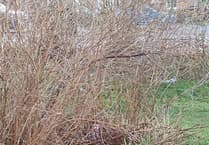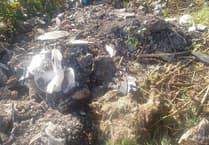Councillors have been trash talking in a bid to stop East Hampshire becoming a dumping ground for fly-tippers.
But two incidents within a week near Bordon shows the battle that East Hampshire District Council faces with less than a handful of prosecutions over a year.
The council has launched a witness appeal after a large pile of bagged waste, pallets, garden fencing and furniture was dumped of Hurlands Lane in Headley on Friday, May 16.
A similar incident took place the following Wednesday near Lindford when a “horrible human being” dumped a mattress, bedframe and other items off Broxhead Farm Road.
Members of an EHDC Task & Finish Group have produced a report with recommendations following a six-month investigation into how to reduce the practice.
The need to curb fly-tipping in the district is growing as offences rose from 1,202 to 1,334 in East Hampshire from 2023 to 2024 with the 11 per cent rise being nearly double the six per cent national average.

Furthermore, just four prosecutions took place in 2024 suggesting the vast majority of fly-tippers are getting away with it.
Five councillors – David Podger, David Ashcroft, Phillip Davies, Penny Flux and Roger Mullenger – were part of a Task & Finish group that held four meetings and sought advice from Hampshire County Council, the police, Farmer’s Union, landowners and neighbouring authorities in an investigation how to reduce the practice.
Their recommendations, backed last week by the EHDC Overview and Scrutiny Committee, have been split into communications, prosecution and enforcement and deterrence.
The council is being encouraged to take a more proactive approach, like putting warning leaflets in council tax letters and embracing a wider communication campaign.
But a tougher line on culprits is also planned, with more “you are being watched” boards and greater use of CCTV in fly-tipping areas, which are often hotspots for other types of criminality.
There are also plans to make greater claims through the courts while proposals to seize vehicles involved in fly-tipping could also be investigated.
“It takes many hours of officer time to investigate and bring to prosecution,” said Cllr Podger.
“If we had a better estimate of the cost and time it takes means we could make an application to court to have the costs recovered.”
It was also made clear during their investigations the majority of fly-tipping offences were carried out from people who live outside the district.
Cllr Podger added: “They are choosing to use the A3 or A31 as a pathway into the district and then finding laybys, country lanes and less frequented spot to dispose of waste.
“It is known to our enforcement officers there are hotspots in the district that have sometimes nefarious and criminal undertakings of other sorts. There are dark areas in our district which are unfortunately the targeted areas for fly-tipping.
“We discussed the possibility of CCTV and mobile cameras and other devices to deter people from using their sites which are often associated with other forms of criminality.
“On the theme of prosecution we’re examining the ways the existing team may have additional resources in able to increase the number of prosecutions.
“There have been successful prosecutions but they are costly, they take a lot of officer time and the punitive measures the courts hand down are not necessarily a deterrent. For some frequent offenders it’s considered a risk of the trade.”
Cllr Ashcroft hailed the “really good” report but called for vehicles to be seized as they are an integral part of the crime.
He said: “These vehicles, if we could get them seized and scrapped, that will give them something to think about next time they go fly-tipping because it’s being used for crime.”
The council is also expanding its enforcement team with an extra £100,000 being recently allocated, with the T&FG findings going before EHDC cabinet this Thursday (May 29).









Comments
This article has no comments yet. Be the first to leave a comment.